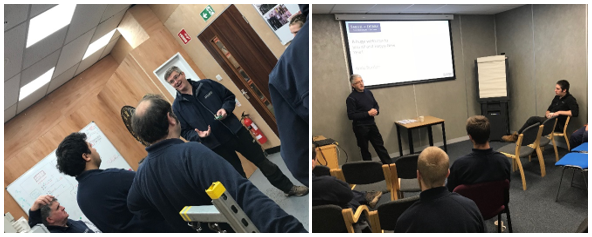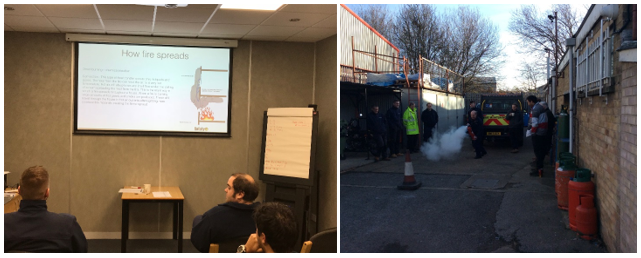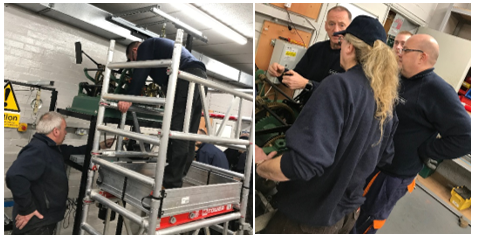Every January a week is put aside for training at Smith of Derby and 2019 has been no different. Last week all of our clockmakers travelled to our Derby works, from their various locations across the UK, to take part in a week of training. The week started with the clockmakers arriving at our Alfreton Road works and unloading their vans so equipment, such as harnesses and other safety apparatus, could be tested by external adjudicators.
Following this, all of the clockmakers were given a presentation from Bob Betts on how the week would progress and the importance of this exercise. “Smith of Derby like to think that our quality within the industry is world class and to maintain this a level of training and investment is regularly required across all sectors including health and safety, customer service and clockmaking. The whole team is brought to our head office for a consolidated training week, this is to execute the critical training required. Having the whole team on site is a great way to start the year, it also offers an opportunity to share and discuss clockmaking know-how and field experiences, so our practices, procedures and policies are continuously improved for the various unique circumstances within the thousands of clocks within our care. Our dedicated training facility is in use throughout the year to develop industry skills and our open-door policy invites other interested parties to review and use this facility if required.” Said Managing Director Bob Betts.
The clockmakers, which included apprentices and individuals with many years of experience, were then split into two groups and would cover the areas of training at different times throughout the week. Team A went straight into the training room and was introduced to a new Smith of Derby product, which will be launched soon, by Quality and Training Manager Tony Charlesworth. Team B remained in the conference room and discussed servicing and installation processes with Andy Burdon, Non-Executive Director. Following lunch Team A went into the conference room to discuss servicing and installation processes, whilst Team B were introduced to our new product.

Tony introduces a new product to the clockmakers whilst Andy Burdon discusses procedures and processes with the team.
The next morning the focus moved to the training room once again for Team B. The day started with them looking at our automatic winding systems, reviewing both installation methods and then learning more about the product in general. The group then reviewed pendulum regulators (PAR), a product which ensures consistent time accuracy for mechanical clocks. Finally, the group finished the day with microset training, a tool regularly used by our clockmakers to accurately set the beat and time of the clock.
The day had a much different, but just as important, focus for Team A. They would be spending the day with Health and Safety Manager Ashley Buckler and external Health and Safety Advisor Justin De-Vere, Director of local company Safety Advisors. Their day would begin with information and procedures when coming across asbestos, a substance regularly found in older buildings across the world. They would then move onto the risk of fire within the industry and processes to follow should fire break out. This part of the day also involved the group heading outside for some hands-on training on how to use fire extinguishers and other equipment. Following lunch, a presentation on health safety was delivered by the Ashley and Justin. This included the group discussing various situations in which they come across and what they should do at those times. Finally, the environment was discussed and methods in which we can reduce our impact at Smith of Derby, something which everyone involved within the company is focused on.

Team A enjoy a presentation on fire safety before clockmaker Brian Parry gets hands on with a fire extinguisher.
Day three was a very similar day to the previous day as the groups swapped over and did the other activities. Team B were joined by the sales team for the sessions on asbestos, fire safety, health and safety and the environment. Team A spent the day in the training room learning further about autowind, PAR and microsets.
The final day and the clockmakers were given arguably their biggest test of the week so far. The focus was stripping down and then putting back together mechanical clocks for both teams. The challenge came from the swapping over of the clocks halfway through the session. Team A would be putting the clock together which Team B dismantled whilst Team B would be assembling Team A’s. Whilst this may have been difficult both teams got the clocks back together and working again ‘in no time at all’!

Clockmakers Tim and Tony look at stripping down a clock before several members of the other team put it back together.
The groups then reflected on the week and attention moved to the year ahead. The vans were re-loaded, and the team were heading to their various locations across the UK. Training and Quality Manager Tony Charlesworth went on to say “it was a joy to see the clockmakers develop their knowledge and refresh themselves on traditional skills, along with learning about new products entering the market. The week was a success however, this is an ongoing process as we are always looking to develop the team’s industry knowledge and our health and safety standards.”